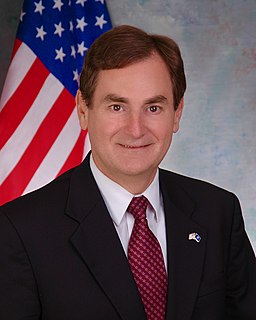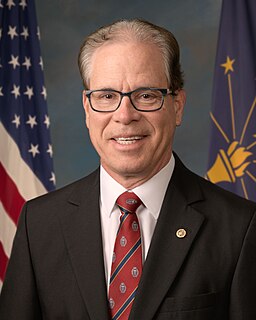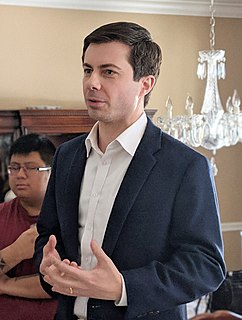Indiana has long been considered to be a Republican stronghold and is rated R+7 on the Cook Partisan Voting Index. The current governor of Indiana is Republican Eric Holcomb, and Republicans hold supermajorities in both chambers of the Indiana General Assembly. It has only supported a Democrat for president five times since 1900—in 1912, 1932, 1936, 1964 and 2008. Nonetheless, half of Indiana's governors in the 20th century were Democrats.

John Richard Gregg is an American businessman, attorney, author, and politician from Indiana. He was a state representative in the Indiana House of Representatives from 1986 to 2003, serving as Majority Leader from 1990 to 1994, Minority Leader for a term, and as the 85th and longest-serving Democratic Speaker of the Indiana House from 1996 to 2003.

The 2010 congressional elections in Indiana were held on November 2, 2010, to determine who would represent the state of Indiana in the United States House of Representatives. Representatives are elected for two-year terms; those elected served in the 112th Congress from January 2011 until January 2013, except for the winner of the 3rd District's special election, who will serve the few remaining weeks of the 111th Congress.

The 2012 United States Senate election in Indiana took place on November 6, 2012, concurrently with the U.S. presidential election as well as other elections to the United States Senate and House of Representatives and various state and local elections.

United States gubernatorial elections were held on November 8, 2016 in 12 states and two territories. The last regular gubernatorial elections for nine of the 12 states took place in 2012. The last gubernatorial elections for New Hampshire, Oregon, and Vermont took place in 2014, as Oregon held a special election due to the resignation of governor John Kitzhaber, while the governors of New Hampshire and Vermont both serve two-year terms. The 2016 gubernatorial elections took place concurrently with several other federal, state, and local elections, including the presidential election, Senate, and House elections.

The 2016 United States Senate election in Indiana was held on November 8, 2016, to elect a member of the United States Senate to represent the State of Indiana, concurrently with the 2016 U.S. presidential election, as well as other elections to the United States Senate in other states and elections to the United States House of Representatives and various state and local elections.

The 2016 Indiana gubernatorial election was held on November 8, 2016, to elect the Governor and Lieutenant Governor of Indiana, concurrently with the 2016 U.S. presidential election as well as elections to the United States Senate and elections to the United States House of Representatives and various state and local elections. The primaries were held on May 3, 2016. Republican Lieutenant Governor Eric Holcomb won the race with 51.4% of the vote.

Elections to the United States Senate will be held on November 3, 2020, with the 33 Class 2 seats of the Senate being contested in regular elections. The winners will be elected to six-year terms extending from January 3, 2021, until January 3, 2027. Additionally, there will be a special election in Arizona to fill the vacancy created by the death of John McCain in 2018.

The 2016 United States House of Representatives elections in Indiana were held on November 8, 2016, to elect the nine U.S. Representatives from the state of Indiana, one from each of the state's nine congressional districts. The elections coincided with the 2016 U.S. presidential election, as well as other elections to the House of Representatives, elections to the United States Senate and various state and local elections. The primaries were held on May 3.

The 2020 United States presidential election, scheduled for Tuesday, November 3, 2020, will be the 59th quadrennial U.S. presidential election. Voters will select presidential electors who in turn on December 14, 2020, will either elect a new president and vice president or re-elect the incumbents. The series of presidential primary elections and caucuses are likely to be held during the first six months of 2020. This nominating process is also an indirect election, where voters cast ballots selecting a slate of delegates to a political party's nominating convention, who then in turn elect their party's presidential nominee.

The 2018 United States Senate election in Indiana took place on November 6, 2018, along with other elections to the United States Senate and House of Representatives and various state and local elections. Incumbent Democratic U.S. Senator Joe Donnelly sought reelection to a second term, facing Republican businessman and former state representative Mike Braun and Libertarian Party nominee Lucy Brenton.
The 2020 United States Senate election in Georgia will be held on November 3, 2020, to elect a member of the United States Senate to represent the State of Georgia, concurrently with the 2020 U.S. presidential election, as well as other elections to the United States Senate in other states and elections to the United States House of Representatives and various state and local elections.

The 2020 United States Senate election in New Mexico will be held on November 3, 2020, to elect a member of the United States Senate to represent the State of New Mexico, concurrently with the 2020 U.S. presidential election, as well as other elections to the United States Senate in other states and elections to the United States House of Representatives and various state and local elections.

United States gubernatorial elections will be held on November 3, 2020 in 11 states and two territories. In addition, special elections may take place if other gubernatorial seats are vacated. The last regular gubernatorial elections for nine of the eleven states took place in 2016. The last gubernatorial elections for New Hampshire and Vermont took place in 2018, as the governors of both states serve two-year terms. All state governors will be eligible for reelection except for Steve Bullock of Montana, although other governors may choose to retire. The 2020 gubernatorial elections will take place concurrently with several other federal, state, and local elections, including the presidential election.
The 2020 Democratic Party presidential primaries and caucuses will be a series of electoral contests organized by the Democratic Party to select at least 3,768 delegates to the Democratic National Convention and determine the Democratic nominee for President of the United States in the 2020 U.S. presidential election. The elections will take place within all fifty U.S. states, the District of Columbia, and five U.S. territories. An extra 764 unpledged delegates or superdelegates, including party leaders and elected officials, will be appointed by the party leadership independently of the primary's electoral process. The convention will also approve the party's platform and vice-presidential nominee.

The 2020 Montana gubernatorial election will be held on November 3, 2020, to elect the Governor of Montana, concurrently with the 2020 U.S. presidential election, as well as elections to the United States Senate and elections to the United States House of Representatives and various state and local elections. Incumbent Democratic Governor Steve Bullock is term-limited and cannot seek re-election to a third term.

The 2020 Missouri gubernatorial election will be held on November 3, 2020, to elect the Governor of Missouri, concurrently with the 2020 U.S. presidential election, as well as elections to the United States Senate and elections to the United States House of Representatives and various state and local elections. Incumbent Republican Governor Mike Parson is eligible to run for a full term in office, but has not yet declared whether he will do so.

The 2020 United States House of Representatives elections in New Mexico will be held on November 3, 2020, to elect the three U.S. Representatives from the state of New Mexico, one from each of the state's three congressional districts. The elections will coincide with the 2020 U.S. presidential election, as well as other elections to the House of Representatives, elections to the United States Senate and various state and local elections.

The 2020 United States House of Representatives elections in Indiana will be held on November 3, 2020, to elect the nine U.S. Representatives from the state of Indiana, one from each of the state's nine congressional districts. The elections will coincide with the 2020 U.S. presidential election, as well as other elections to the House of Representatives, elections to the United States Senate and various state and local elections.

The 2020 United States House of Representatives elections in Minnesota will be held on November 3, 2020, to elect the eight U.S. Representatives from the state of Minnesota, one from each of the state's eight congressional districts. The elections will coincide with the 2020 U.S. presidential election, as well as other elections to the House of Representatives, elections to the United States Senate and various state and local elections.





















